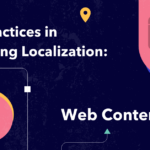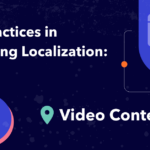 Digital technologies have made connecting with your global audience easier than ever. Expanding into new markets involves replicating your market assets — like your website — across new languages and locales. In this context, delivering a consistent customer experience across languages by properly localizing your website is a key step in fully engaging with customers in new markets. But what can you do to help those new customers find your website?
Digital technologies have made connecting with your global audience easier than ever. Expanding into new markets involves replicating your market assets — like your website — across new languages and locales. In this context, delivering a consistent customer experience across languages by properly localizing your website is a key step in fully engaging with customers in new markets. But what can you do to help those new customers find your website?
A localized website is nothing without localized multilingual SEO. It’s like having a store in the middle of nowhere and wondering why you don’t get customers. Search engine optimization is a fundamental pillar to the success of your website localization. However, search habits are often different across cultures and the keywords your customers use are not direct translations of your English keywords. This means that the optimization you’ve carried out in your native language won’t always impact your website in other languages and you’ll need to localize your keywords for your target markets. You’ll also need to make sure that your technology is shipshape to deliver the best CX in your target markets as search engines will also take this into account when ranking your website.
Good content and equally good translations are key for impactful multilingual SEO. Search engines will prioritize well-written websites in the right language and market, and that will drive traffic on its own. But, in a competitive environment where the average web user won’t go past the first five listings on a search engine results page, to really boost your SEO and make it to the top page of search engine results, here are four elements to address:
1. Consider all your content
There’s so much content that is critical to SEO. Not only the content visible to the user — such as home, services and landing pages, product descriptions, blogs, and other resources — but you also need to optimize your metadata, alt text, categories, and friendly URLs. All this data needs to be sent to your translation partner with the relevant context to enable a good SEO optimization effort.
2. Tailor your keywords
Keywords that carry impact in one market may not resonate in the next. This will also depend on your industry. So it’s not always the best option to directly translate your native language keywords into your target market. For example, an English-speaking fintech company may use “equity compensation” as a keyword for their target audience, but in many countries this non-cash payment for employees isn’t a common practice and so the term doesn’t have enough search volume in those countries. Instead, they would have to use target keywords around employee “incentives”.
Your translation partner may be able to identify more relevant keywords in the target language that don’t have a corresponding translation in your native language. This may, for example, include using specialized tools to research the keywords your competitors rank for or finding similar keywords to the ones you use for each topic cluster. Doing this research will help boost your website traffic, and ultimately increase your conversion rate.
3. Optimize your content for keywords
To properly optimize the content for search engines in other languages you may need to perform a new keyword research and then optimize your content for these keywords.
These keywords need to be employed on your website to boost your SEO. Identify which pages are the focus and where you plan to drive more traffic, and map out your new keywords for these pages. You can then get the pages optimized around those keywords by native-language digital marketing experts. They will make sure the keywords are included in the right sections and with the right keyword density.
4. Address your tech
There are technical areas across the website that you may need to address. For instance, while search engines will detect the language of the page using its own algorithms, you’ll want to link the pages that have localized variations of the same content (for example, linking your ‘Contact us’ pages across your various languages). If you have a high-traffic page in English, the search engine will have this information available for ranking your other languages. You can do this in your sitemap and using special HTML tags or HTTP headers.
Similarly, the end UX of your website will not only depend on the content, but also on the underlying technology and in particular, the speed of the page. No one wants to wait too long for a page to load and search engines know — and penalize — this. Last year, Google introduced the concept of Web Vitals to measure and improve the core UX areas of a website. When you expand into different markets, your website may be slower in these new countries depending on your hosting location and configuration if you don’t prepare for it.
Another important decision is how you would technically structure your sites for other languages, you have a number of options:
-
subdomains, e.g., de.unbabel.com
-
top-level domains, e.g., unbabel.de
-
subfolders, e.g., unbabel.com/de
Each comes with its own pros and cons in terms of the SEO impact. Search engines reward you for having a domain in each country, but it comes at a cost for the tech team and even the legal team. For example, you would need to add new types of legal disclaimers if you have the site “.de”
In some cases, you may also need to optimize the website for search engines that have different requirements, such as Baidu for China or Yandex for Russia. For example, the Great Firewall in China typically won’t block your corporate website, but to achieve optimal SEO results on Baidu, you should still consider hosting your Chinese site on a web server in a China datacenter.
Expanding your business’ online presence into new markets can feel daunting. Our multilingual SEO experts can provide guidance tailored to your industry and content types — reach out here:











